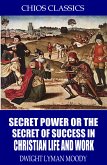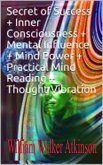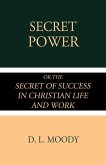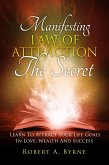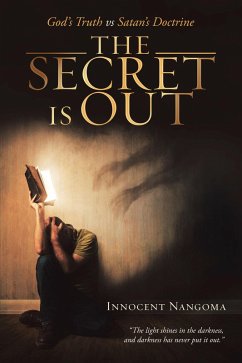"Secret Power", written by Dwight Lyman Moody in 1881, is a rallying cry for action to all Christians, encouraging believers to bring out the true potential of their church, with an intensity and scale scarcely seen for centuries.
This work is a solid Christian reading with a focus on the power of the Holy Spirit and His availability to work in our lives when we submit. Moody presents a few relevant points:
1. We cannot work for God without love.
2. God, through the Holy Spirit, will give encouragement.
3. The Gospel is every bit as powerful today as it was thousands of years ago.
4. The Holy Spirit will fill us with His presence and power when we empty ourselves of pride, vanity, and other worldly attitudes (submit)
5. When God's Spirit is on us, the world looks very empty and we begin to let go of it as we begin to focus on the eternal.
6. When we have God's Spirit on us, we will speak with authority and power.
7. True service to God is marked by waiting to receive His power in His time and way.
Standing at the forefront of the Christian Revival movement of the 19th century, Moody was one of the principle figures responsible for a great resurgence in belief throughout North America. His charismatic pleas to the public of the United States to comprehend and act upon the power of God were successful, and he was able to encourage established and frontier communities alike toward spiritual practice.
In Moody's view, the church had lost its luster over the centuries. Much of the old doctrine and ceremony was losing its resonance with believers, who found it hard to comprehend. Decrying this spiritual impotency, the author advocates for a new and open form of Christianity, which accounts for the facts of the believer's everyday life and trials - such inclusive mindfulness would restore and expand the church's sublime relevance.
This work is a solid Christian reading with a focus on the power of the Holy Spirit and His availability to work in our lives when we submit. Moody presents a few relevant points:
1. We cannot work for God without love.
2. God, through the Holy Spirit, will give encouragement.
3. The Gospel is every bit as powerful today as it was thousands of years ago.
4. The Holy Spirit will fill us with His presence and power when we empty ourselves of pride, vanity, and other worldly attitudes (submit)
5. When God's Spirit is on us, the world looks very empty and we begin to let go of it as we begin to focus on the eternal.
6. When we have God's Spirit on us, we will speak with authority and power.
7. True service to God is marked by waiting to receive His power in His time and way.
Standing at the forefront of the Christian Revival movement of the 19th century, Moody was one of the principle figures responsible for a great resurgence in belief throughout North America. His charismatic pleas to the public of the United States to comprehend and act upon the power of God were successful, and he was able to encourage established and frontier communities alike toward spiritual practice.
In Moody's view, the church had lost its luster over the centuries. Much of the old doctrine and ceremony was losing its resonance with believers, who found it hard to comprehend. Decrying this spiritual impotency, the author advocates for a new and open form of Christianity, which accounts for the facts of the believer's everyday life and trials - such inclusive mindfulness would restore and expand the church's sublime relevance.




